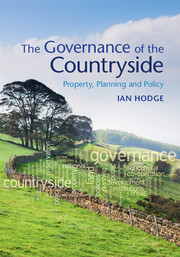Book contents
- Frontmatter
- Contents
- Preface
- Acknowledgements
- List of abbreviations
- Part I Introduction
- Part II Historical models
- Part III Governance under sectoral policies
- 6 Agricultural policies, farming and the environment
- 7 Land, development and planning
- 8 Protected Areas: the example of National Parks
- 9 Wildlife conservation: National Nature Reserves, Sites of Special Scientific Interest and Large-scale Conservation Areas
- 10 Public rights of way and access to the countryside
- 11 The control of agricultural pollution
- 12 The development of agri-environment policy
- Part IV Alternative approaches to governance
- Part V Conclusions
- References
- Index
7 - Land, development and planning
from Part III - Governance under sectoral policies
Published online by Cambridge University Press: 05 February 2016
- Frontmatter
- Contents
- Preface
- Acknowledgements
- List of abbreviations
- Part I Introduction
- Part II Historical models
- Part III Governance under sectoral policies
- 6 Agricultural policies, farming and the environment
- 7 Land, development and planning
- 8 Protected Areas: the example of National Parks
- 9 Wildlife conservation: National Nature Reserves, Sites of Special Scientific Interest and Large-scale Conservation Areas
- 10 Public rights of way and access to the countryside
- 11 The control of agricultural pollution
- 12 The development of agri-environment policy
- Part IV Alternative approaches to governance
- Part V Conclusions
- References
- Index
Summary
Much of the urbanisation that has occurred over the last 80 years (and which continues today) can fairly be described as ‘sprawl’. It wastes land. It is placeless, lacking in local character and beauty. It harms the wider environment as well as consuming fields, woods and heaths. We can do so much better.
Campaign to Protect Rural England (2003) Housing and Urban Sprawl Policy Position Paper. CPRE, London (p. 1)Land fetishism is a uniquely English mental disorder.…The plain conclusion is that we have plenty of land for building, almost wherever we like.
Peter Hall (2005) The Land Fetish. Town and Country Planning Association, London (pp. 1 and 7)7.1 The development of land: the basic problem
Major changes in land use have many consequences well beyond those for the landowners and occupiers themselves. Industrial activities may be sources of pollution. Commercial activities may attract heavy delivery vehicles. The change of land use may be irreversible, precluding the possibility that the land could be put into some other use in the future. There may be wider implications for land drainage, water quality, noise, local amenity and landscape, biodiversity, the demand for local services, local traffic movements, or local property prices. In a world of non-attenuated property rights, the property owner would bear the full costs and benefits of a change in land use and so might be expected to make decisions about land uses that would be similar to those preferred by society as a whole. However, because we do not live in such a world and for a variety of other reasons, social, ethical and cultural, societies invariably operate systems to regulate land uses. These may take many forms, such as through land-use zoning or control over minimum block size. In the United Kingdom, there is a complex regulatory system that controls changes in land use, often in considerable detail.
In this chapter, we outline the background to this system and the way in which it operates in practice. This is another area in which seminal legislation dating from the 1940s has had a major and lasting impact on the way in which the system operates. It sets the UK apart from planning systems in most other countries, and is often highly regarded by them; greater criticisms are heard from those who live within its ambit.
- Type
- Chapter
- Information
- The Governance of the CountrysideProperty, Planning and Policy, pp. 142 - 162Publisher: Cambridge University PressPrint publication year: 2016



